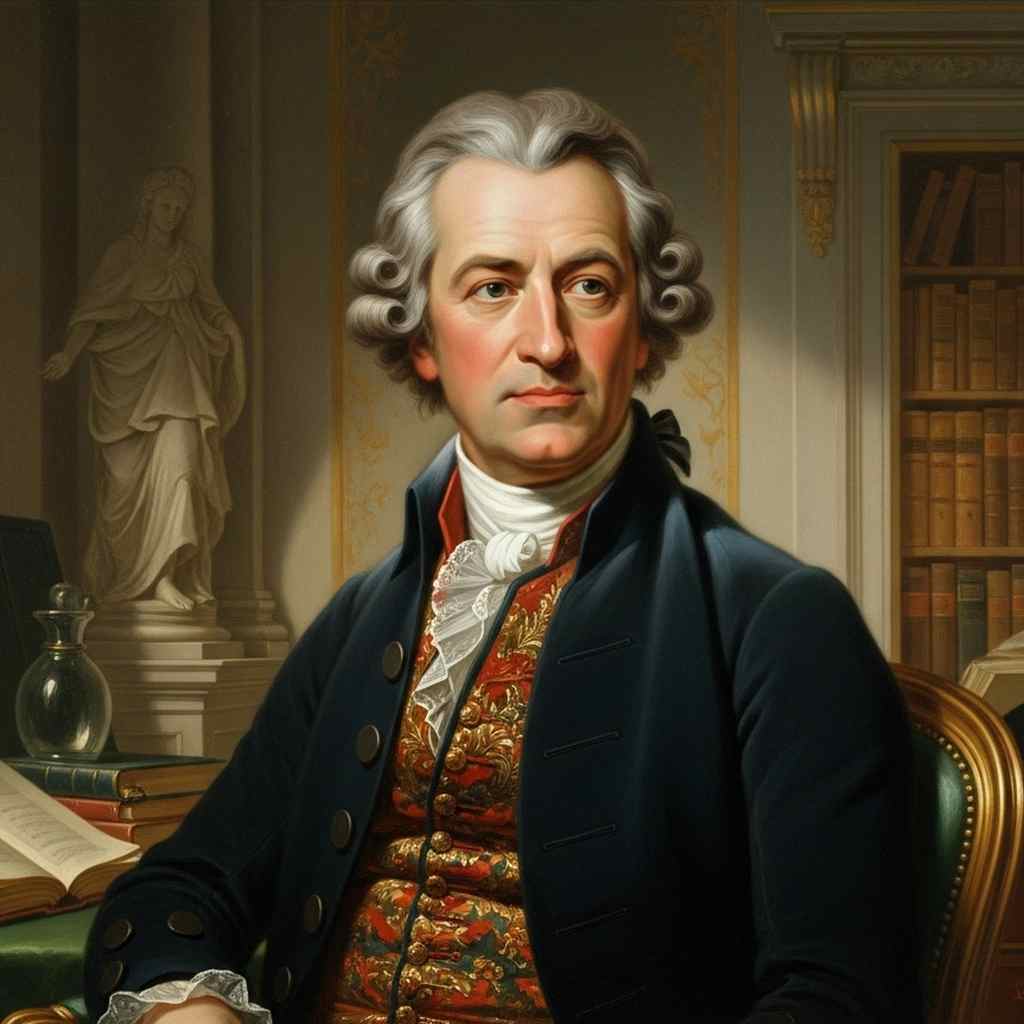1 Poems by Johann Wolfgang von Goethe
1749 - 1832
Johann Wolfgang von Goethe Biography
Johann Wolfgang von Goethe occupies a towering place in Western literature, a figure whose impact spans poetry, drama, prose, philosophy, and science. Often regarded as Germany’s greatest literary voice, Goethe was a polymath who not only helped shape the cultural fabric of German-speaking Europe but whose works have had profound influence on literary traditions around the world. Born in Frankfurt in 1749, Goethe was a Renaissance man whose intellectual pursuits and personal experiences intricately wove into his creative expressions, making his work a complex yet immensely rewarding tapestry of Enlightenment ideals, Romantic passion, and timeless humanism.
Goethe was born into a comfortable bourgeois family, giving him a childhood filled with ample opportunities for intellectual development. His father, Johann Caspar Goethe, was a strict and somewhat formal man with a strong commitment to classical education, ensuring that young Goethe had access to a wide range of disciplines from an early age. His mother, Katharina Elisabeth Textor, in contrast, was warm and imaginative, nurturing his love for storytelling and art. Goethe was thus raised in an environment where discipline and creativity intersected, a foundation that would fuel his later ambitions. He showed precocious literary talent and curiosity, exploring a variety of topics, languages, and artistic pursuits as a child.
Goethe’s formal education began with law at the University of Leipzig, a path influenced by his father’s wish for him to pursue a respectable profession. Though he ultimately complied, Goethe found the legal discipline uninspiring and often dull. Instead, he devoted much of his time to art and literature, attending drawing lessons, visiting art galleries, and studying with Adam Friedrich Oeser, a painter who introduced him to the aesthetics of Neoclassicism. His early years in Leipzig were marked by personal exploration, romantic infatuations, and a budding interest in poetry. It was in Leipzig that Goethe composed some of his first poems, though his mature voice had yet to crystallize. This period taught him that his true calling was not in law, but in literature—a realization that would fully manifest upon his return home in 1768, following a bout of illness that interrupted his studies.
Goethe completed his legal education at the University of Strasbourg, where he met Johann Gottfried Herder, a pivotal figure in his intellectual and artistic development. Herder, a philosopher and critic, introduced Goethe to the ideas of Sturm und Drang, the proto-Romantic movement emphasizing emotional spontaneity and individualism, which was then emerging as a counterpoint to the rationalism of the Enlightenment. Inspired by Herder’s admiration for Shakespeare and German folk traditions, Goethe began to explore the emotional and psychological depths of his characters. He sought to create works that were vibrant, untamed, and reflective of the human soul’s inner turmoil. The result was The Sorrows of Young Werther, published in 1774, a novel that established Goethe’s fame across Europe almost overnight. A semi-autobiographical tale of unrequited love, Werther captured the existential despair of the Sturm und Drang generation, who found themselves suffocated by the rigid social conventions of the time. The novel’s impact was extraordinary; young readers emulated its protagonist, Werther, in both fashion and, tragically, in the wave of suicides that followed its publication—a phenomenon sometimes referred to as "Werther Fever."
Though Goethe quickly became wary of the intense identification readers had with Werther, the novel nonetheless set the stage for his exploration of human passions and existential inquiry. The success of Werther granted him a reputation that led to his appointment as a member of the Duke of Weimar’s court, where he would spend much of his life. In Weimar, Goethe found a steady environment where he could further his intellectual and creative pursuits. He quickly rose in the ranks, managing various administrative roles and overseeing mining, military, and educational reforms. His intense commitment to his civic duties led to a brief but significant pause in his literary output. Yet even in this hiatus, Goethe’s experiences in governance deepened his understanding of the practical and ethical issues of leadership, which would later emerge in his dramatic and poetic works.
By the mid-1780s, Goethe sought personal and creative renewal, feeling constrained by the formalities of court life and the expectations that came with his fame. He traveled to Italy, a journey that proved transformative. The two-year sojourn reignited his passion for art and classical antiquity, shifting his focus from the stormy emotionalism of his earlier work to a more harmonious, balanced aesthetic grounded in classical ideals. Goethe immersed himself in the Renaissance and Greco-Roman art, an experience that inspired the creation of Iphigenia in Tauris and Torquato Tasso, works that reflect a refined, classical clarity. This Italian journey marked the start of Goethe’s self-proclaimed “second” creative life, and his artistic philosophy began to shift toward what he termed “Weimar Classicism.” Goethe’s Weimar Classicism strove for a synthesis of form and content, a belief that art should strive for an idealized beauty that elevates the human spirit rather than indulge in the chaotic emotions championed by Sturm und Drang.
Upon his return to Weimar, Goethe resumed writing with renewed vigor, eventually embarking on his magnum opus, Faust. Conceived over a span of sixty years, Faust is a work of staggering ambition and scope. It tells the story of Dr. Faustus, a scholar who, in his thirst for knowledge and worldly pleasure, makes a pact with Mephistopheles, a devilish figure. Goethe’s Faust explores timeless themes of human ambition, knowledge, love, and redemption, and stands as one of the most profound examinations of the human condition in Western literature. The work is divided into two parts, each markedly different in tone and content. Faust Part I, published in 1808, is the more accessible of the two, with its emotional intensity and tragic love story between Faust and Gretchen. Part II, published posthumously in 1832, expands into a cosmic and allegorical exploration of human civilization, art, politics, and metaphysical yearning. Goethe labored over Faust intermittently throughout his life, making it a kind of evolving mirror for his shifting philosophical and spiritual beliefs.
Though Goethe is often remembered for Faust and Werther, his poetic contributions are equally vital to his legacy. His lyric poetry, particularly the collection known as the West-Eastern Divan, showcases his cross-cultural curiosity and literary innovation. Inspired by the Persian poet Hafez, West-Eastern Divan reflects Goethe’s fascination with Islamic and Persian culture, an interest that emerged during a time of increasing European imperialism and Orientalist scholarship. The Divan is a series of lyrical reflections that span themes of love, nature, and mysticism, emphasizing Goethe’s belief in a universal humanity that transcends geographic and cultural boundaries. Goethe’s concept of “Weltliteratur” (world literature) emerged from this period, a term he used to advocate for a literary cosmopolitanism that acknowledged the interconnectedness of global cultures.
In addition to his literary achievements, Goethe had a deep interest in science, particularly in botany, anatomy, and optics. His scientific endeavors, though less celebrated than his literary work, illustrate his commitment to understanding the natural world and humanity’s place within it. His Theory of Colors, for example, proposed that colors are perceived through an interaction of light and darkness, in opposition to Newton’s purely mechanistic theory of color. Though controversial and later discredited in the scientific community, Goethe’s work on color theory was influential among artists and philosophers, notably influencing figures such as J.M.W. Turner and Arthur Schopenhauer. Goethe’s scientific inquiries, though sometimes flawed, demonstrate his dedication to synthesizing art and science, a testament to his belief in the unity of all knowledge.
Throughout his life, Goethe maintained relationships with many of the leading intellectuals of his time, including Friedrich Schiller, with whom he shared a close friendship and collaborative rivalry. Their partnership helped define the Weimar Classical movement, with Schiller encouraging Goethe to revisit dramatic and poetic forms that would push beyond his classical tendencies. The intellectual exchange between Goethe and Schiller was immensely productive, resulting in some of Goethe’s finest dramatic works and a shared vision of art as a force for moral and intellectual elevation.
As Goethe aged, his thoughts turned increasingly toward metaphysical and philosophical questions. His later works, including Wilhelm Meister’s Apprenticeship and Elective Affinities, reflect a growing preoccupation with fate, free will, and the moral complexities of human relationships. Elective Affinities, in particular, explores the scientific notion of chemical affinities as a metaphor for human attraction and relationships, examining the inevitability and tragedy of desire. These novels, often enigmatic and intellectually dense, reveal Goethe’s evolving perspective on human nature, showing him as both a detached observer of and an empathetic participant in the human experience.
Goethe’s influence on subsequent literary movements is profound and far-reaching. The Romantic poets of England, including Lord Byron, Percy Bysshe Shelley, and Samuel Taylor Coleridge, were deeply inspired by his works, particularly Faust and Werther. Goethe’s philosophical and poetic explorations also had an impact on the transcendentalist movement in the United States, with Ralph Waldo Emerson and Henry David Thoreau regarding him as a kindred spirit in their quest for intellectual and spiritual self-realization. His concept of Weltliteratur would foreshadow later discussions on globalization and cultural exchange, positioning him as a visionary who understood literature as a bridge between cultures.
Goethe passed away in 1832 in Weimar, his life an extraordinary testament to the breadth and depth of human creativity. His legacy is not merely in the remarkable body of work he left behind but in the way he exemplified the potential of a life lived in pursuit of intellectual and artistic truth. A universal genius, Goethe’s ability to harmonize the scientific and the poetic, the classical and the modern, the rational and the romantic, remains a model for those who seek to understand the human condition in all its complexity. He is celebrated not only as Germany’s greatest poet but as one of the world’s quintessential literary figures, a man whose work speaks across time, culture, and discipline, forever inscribing him in the annals of world literature.
This text was generated by AI and is for reference only. Learn more
Username Information
No username is open
Everything is free to use, but donations are always appreciated.
Quick Links
© 2024-2025 R.I.Chalmers (V2Melody).

All music on this site by R.I.Chalmers (V2Melody) is licensed under a Creative Commons Attribution-NonCommercial 4.0 International License.
Attribution Requirement:
When using this music, you must give appropriate credit by including the following statement (or equivalent) wherever the music is used or credited:
"Music by R.I.Chalmers (V2Melody) – https://v2melody.com"
Support My Work:
If you enjoy this music and would like to support future creations, your thanks are always welcome but never required.
Thanks!


